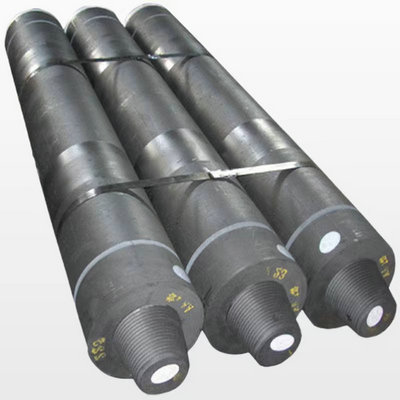Graphite electrodes are crucial components in the operation of arc furnaces, serving a vital role in various industrial processes.
Graphite electrodes are primarily made from a form of carbon called graphite, which is a crystalline form of the element carbon. Graphite possesses unique properties that make it ideal for use in electrodes, such as its high electrical conductivity, high resistance to heat and chemicals, and low coefficient of thermal expansion. These properties enable graphite electrodes to perform exceptionally well in arc furnace applications.
The graphite electrodes manufacturing process involves several steps. It begins with the selection of high-quality graphite materials, which are then ground and mixed with a binder material, such as coal tar pitch or petroleum coke. This mixture is then shaped into the desired electrode form using a molding process. After molding, the electrodes are subjected to a baking process to remove the binder and further strengthen the carbon structure. This is followed by the graphitization process, which involves heating the electrodes to temperatures of around 3000 degrees Celsius to convert them into graphite. Finally, the electrodes undergo a series of quality control tests to ensure their performance and reliability.
Graphite electrodes find extensive applications in various industrial processes, particularly in electric arc furnaces. These furnaces are used for the production of steel, where graphite electrodes serve as conductive materials to generate and maintain an electric arc, which melts the raw materials and allows for the formation of molten metal. Additionally, graphite electrodes are used in other metallurgical processes such as the production of ferroalloys, silicon metal, and calcium carbide.
The significance of graphite electrodes in industrial settings cannot be overstated. Their high thermal conductivity allows for efficient heat transfer, enabling faster and more precise melting of materials in arc furnaces. Graphite electrodes also exhibit excellent resistance to thermal shock, preventing them from cracking or breaking under extreme temperature conditions. This durability ensures prolonged electrode life and minimizes downtime and maintenance costs.
Furthermore, the graphite electrodes electrical conductivity is another critical factor in their industrial importance. The high conductivity enables the efficient flow of electricity through the electrodes, resulting in a stable and consistent arc during the melting process. This ensures a uniform and controlled distribution of heat, leading to improved steel quality and consistency.
The size and quality of graphite electrodes significantly impact their performance in arc furnace operations. The dimensions of the electrodes, such as their diameter and length, vary depending on the specific furnace design and production requirements. Manufacturers produce a wide range of electrode sizes to accommodate different furnace types and capacities.
Manufacturers of graphite electrodes play a vital role in supplying these essential components to industries worldwide. These manufacturers must adhere to strict quality control measures to ensure the production of electrodes that meet the industry standards. Quality control includes tests for physical properties, such as density and thermal expansion, as well as electrical properties, such as resistivity and specific electrical resistance. By maintaining consistent quality standards, graphite electrode manufacturers contribute to the overall efficiency and productivity of arc furnace operations.
In conclusion, graphite electrodes are essential in the functioning of arc furnaces and play a crucial role in numerous industrial processes. Their unique properties, such as high electrical conductivity, thermal resistance, and durability, make them ideal for use in these applications. The manufacturing process of graphite electrodes involves careful selection of high-quality graphite materials, followed by a series of steps like mixing, shaping, baking, and graphitization. Graphite electrodes find applications in steel production and various metallurgical processes. Their significance lies in their ability to efficiently transfer heat, resist thermal shock, and provide stable electrical conductivity. Overall, graphite electrode manufacturers play a pivotal role in supplying high-quality electrodes and ensuring the efficiency and reliability of industrial operations.
CONTACT US FOR CORRECT INFORMATION ABOUT GRAPHITE ELECTRODES.
Post time: Oct-11-2023







